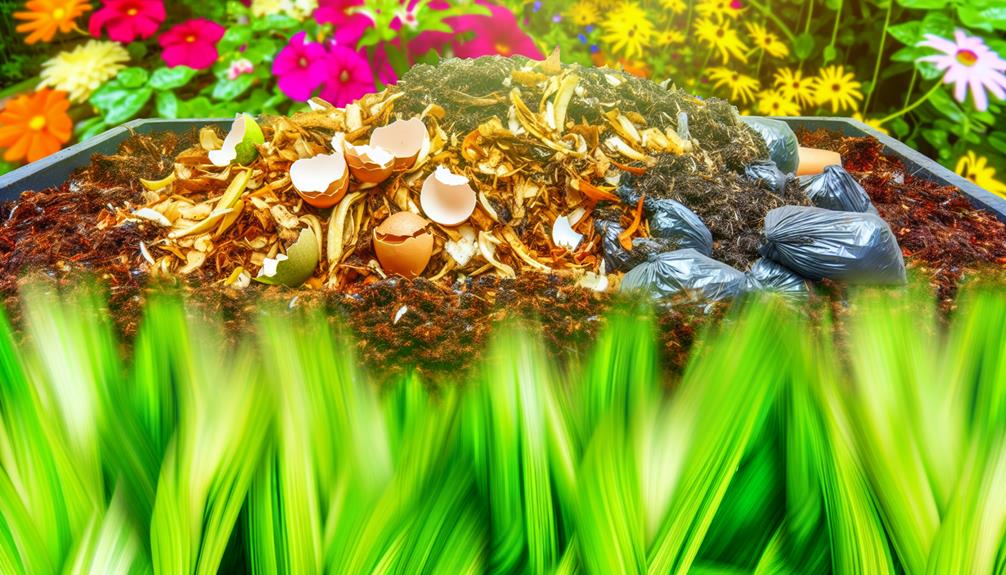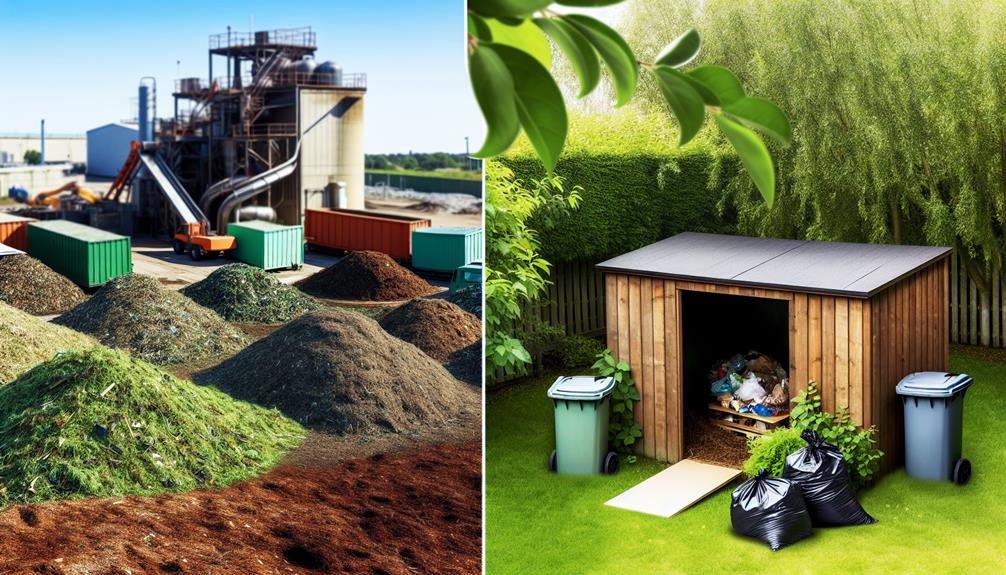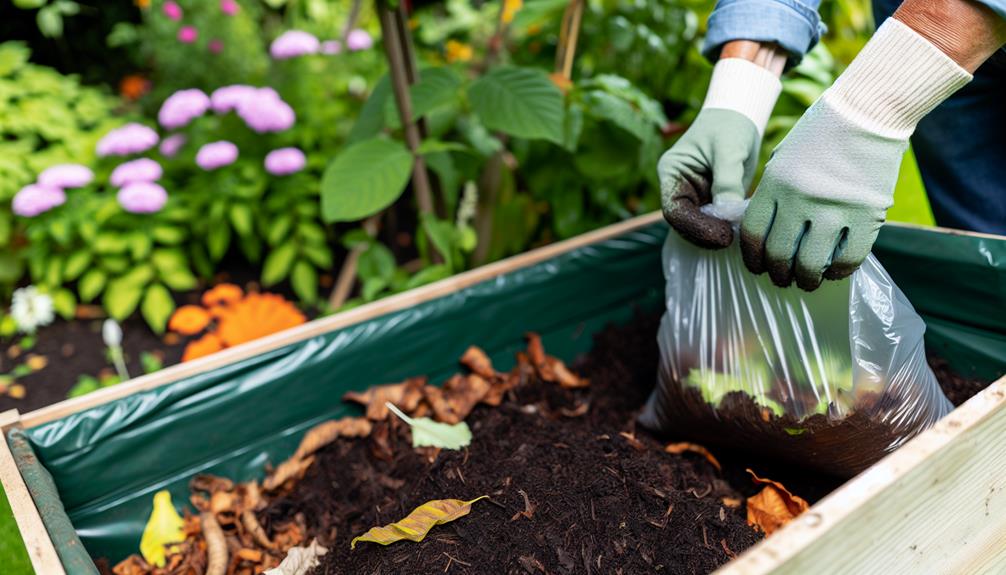

You can compost biodegradable plastic bags, but it’s not as simple as tossing them in your backyard compost. These bags, often made from cornstarch or PLA, need specific conditions to break down properly. They decompose best in industrial composting facilities with higher temperatures and controlled environments. Home compost piles usually lack these conditions, leading to slower degradation.
If you’re keen on trying it at home, you can bury a bag in your pile and monitor it over months, but be patient. For a greener impact, consider alternatives like reusable cotton or hemp bags. Discover more tips and insights to become a composting expert.
Biodegradable plastics, unlike traditional plastics, break down more quickly due to their unique chemical composition. These materials are designed to decompose when exposed to natural environmental conditions, such as sunlight, moisture, and microorganisms.
Because they’re made from renewable resources like corn starch or sugarcane, they’re more environmentally friendly. You might feel a sense of pride knowing you’re helping reduce pollution and waste when using these products.
By understanding how biodegradable plastics work, you’re joining a community of eco-conscious individuals who are making a significant impact. When these plastics break down, they return to natural elements, leaving less harmful residue.
This knowledge empowers you to make informed choices, contributing positively to the planet’s health.
Also Read: Can You Compost Yogurt?
You’ll find several types of biodegradable plastic bags, each designed for specific uses and environmental conditions. Some are made from plant-based materials like cornstarch, which break down naturally and quickly. Others are composed of polylactic acid (PLA), derived from renewable resources like sugarcane or cornstarch, offering a more eco-friendly alternative to traditional plastics.
There are also bags labeled as oxo-biodegradable, containing additives that help them degrade faster under sunlight and oxygen exposure. Each type has its own set of advantages, making them suitable for different purposes. By understanding these differences, you’ll feel more connected to a community that prioritizes sustainability and can make informed choices to reduce environmental impact.
You’ll be amazed at how biodegradable plastics break down through a chemical process that transforms them into natural elements. Factors like temperature, moisture, and the presence of microorganisms greatly impact this degradation.
Understanding these elements helps you appreciate the environmental benefits and complexities of composting biodegradable plastic bags.
Biodegradable plastics break down through a series of chemical reactions facilitated by microorganisms, heat, and moisture.
When you compost these bags, microorganisms like bacteria and fungi feast on them, breaking down their structure. Heat speeds up this process, making it quicker and more efficient.
Moisture is also essential because it softens the plastic, making it easier for microorganisms to digest. Enzymes produced by these tiny creatures help break the plastic into smaller molecules, which eventually turn into carbon dioxide, water, and biomass.
As biodegradable plastics break down, several environmental factors like temperature, humidity, and the presence of microorganisms greatly influence their degradation rate.
You’ll find that warmer temperatures speed up the process, making those summer months ideal. Humidity also plays a key role; higher moisture levels help microorganisms thrive, which in turn accelerates decomposition.
Speaking of microorganisms, they’re the unsung heroes here. These tiny life forms break down the plastic, turning it into compost. Without them, the process would take much longer.
Also Read: Can You Compost Rust?
When comparing industrial and home composting, you’ll notice that biodegradable plastic bags break down at different rates, influenced by the specific conditions each method provides.

Industrial composting facilities maintain higher temperatures and controlled environments, speeding up the decomposition process. Additionally, certification standards play an important role, in ensuring that the biodegradable plastics you’re using meet the necessary requirements for effective composting.
The time it takes for biodegradable plastic bags to break down varies considerably between industrial composting facilities and home composting setups. In industrial settings, the process is much faster, often taking just a few months because of controlled conditions and higher temperatures. This means less waiting and more efficient composting.
On the other hand, home composting systems can take a considerably longer time, sometimes up to a couple of years. This is due to the less consistent temperatures and conditions in a typical backyard compost pile.
Industrial composting facilities maintain higher temperatures, speeding up the breakdown of biodegradable plastic bags. This environment reaches up to 140°F, ensuring rapid decomposition.
In contrast, home composting operates at lower temperatures, around 65-100°F, which means the process can be much slower. You might find that biodegradable plastic bags take a considerably longer time to break down in your backyard compost pile.
Understanding certification standards is crucial when selecting biodegradable plastic bags for either industrial or home composting. Certification guarantees that the bags will break down properly, preventing contamination of your compost.
Here are four key points to bear in mind:
Also Read: Can You Compost Yard Trimming?
Switching to compostable plastic bags can greatly reduce your carbon footprint. By choosing these eco-friendly alternatives, you’re actively participating in a movement that values our planet’s future.
Unlike traditional plastic, compostable bags break down into organic matter, reducing waste in landfills and lowering greenhouse gas emissions. These bags decompose naturally, enriching the soil and supporting healthier ecosystems. It’s a small change with a big impact, and every step counts.
When you opt for compostable bags, you’re not just making a choice; you’re joining a community that prioritizes environmental sustainability. This collective effort helps protect wildlife, conserve resources, and create a cleaner, greener world. Together, we can make a difference and inspire others to follow suit.
To guarantee that your compostable plastic bags perform as promised, you’ll need to conduct thorough testing. It’s exciting to confirm you’re doing your part for the environment, and testing helps you validate the bags’ compostability.

Here’s how you can do it:
This hands-on process supports your eco-friendly journey!
Also Read: Can You Compost Passion Fruit?
While testing biodegradable bags is a great start, exploring alternatives to biodegradable plastics can further enhance your eco-friendly efforts.
Switch to reusable bags made from materials like cotton, jute, or hemp. These options are durable, often washable, and reduce waste.
Glass containers and stainless steel lunchboxes are excellent for food storage, cutting down on single-use plastics.
Beeswax wraps can replace plastic wrap for covering food, offering a natural and reusable alternative.
Additionally, consider buying products with minimal or no packaging.
By making these small changes, you join a community dedicated to sustainability, fostering a sense of belonging.
Mastering eco-friendly composting starts with understanding what materials can and can’t be composted. To make your composting efforts more sustainable, follow these practical tips:
So, can you compost biodegradable plastic bags? Absolutely, but it’s not always straightforward. You’ll need to check if they’re suitable for home composting or require industrial facilities.
Understanding the types of biodegradable plastics and their decomposition processes is essential. By making informed choices and exploring alternatives, you’re actively contributing to a healthier planet.
Remember, every small step counts in reducing waste and promoting sustainability. Let’s work together to make eco-friendly composting a reality!
